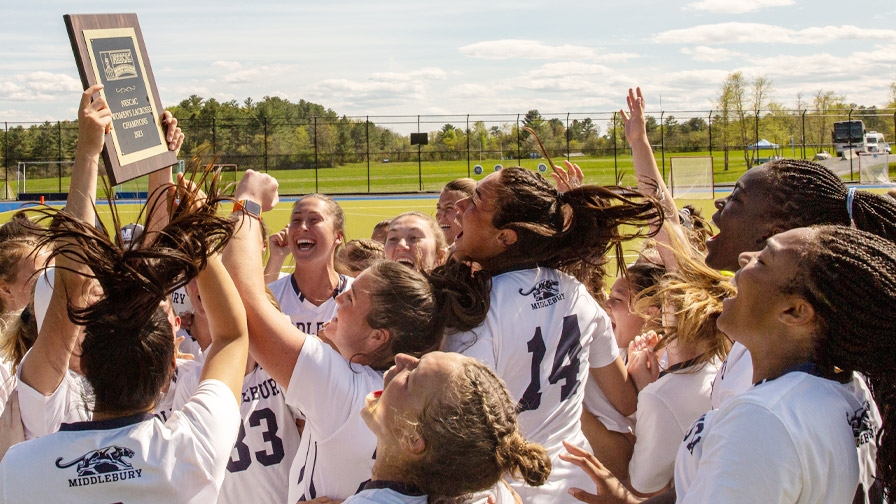What It Takes to Triumph
What It Takes to Triumph

For Dani Ellis, the full-time assistant coach of the varsity women’s lacrosse team until this fall, there was no such thing as a typical 9-to-5.
On any given day during the season, Ellis might have been found analyzing practice footage and film from opponents’ games, answering recruitment emails, taking phone calls and Zoom meetings, strategizing practice drills with head coach Kate Perine Livesay ’03 and part-time assistant coach Amy Patton, managing parent volunteers, booking hotels, planning postgame food orders so players could have meals—the list goes on. And when a player needed to talk, plans could change in an instant.
“The student-athletes are why we’re here, so no matter how long that takes, that’s the time you need to spend,” Ellis says.
A full-time assistant coach is one of the hardest positions out there, responsible for all the behind-the-scenes work.”
Ellis spent two years as a full-time assistant coach at Middlebury before moving on to the University of Massachusetts. This fall, Olivia Seymour, a 2022 Hamilton grad, joined the team as assistant coach. They are the latest in a line of exceptional women, including Williams head coach Alice Lee and Kate Livesay herself, who have taken on this critical role at Middlebury.
“Our full-time assistant position is invaluable to our program,” Livesay says. “Not only does it support our day-to-day essential responsibilities, it also exposes our players to confident, capable, and motivated young professionals. It is wonderful to see different personalities come through and authentically connect with our student-athletes, showcasing different strengths and skills but consistently showing a commitment to the core mission of our program.”
Some other varsity teams have a part-time, seasonal assistant coach, but building a program happens year-round. “People think, ‘Oh, you coach—you have practices and games,’” Ellis says. “But that’s maybe 10 percent of the job, and just during the fall and the spring. The rest of the year we’re on the road, recruiting. It doesn’t stop.”
This hard work has paid off as the team won both NESCAC and NCAA championships this past spring, its third consecutive NCAA championship.
Assistant coaches are critical to team cohesion and provide an important bridge between players and the head coach, Livesay says. The head coach’s job is the big picture. The assistant coach has the flexibility to check in with people, really get to know players one on one, and figure out what motivates them—creating individual relationships that can help each person thrive.
“The opportunity to develop a relationship off the field with our assistant in the fall directly translates to our on-the-field success in the spring,” says co-captain Susan Rowley ’25. “Whether it’s providing feedback during practice or being a supportive presence during the off season, our assistant coach is an integral member of our team and our Middlebury experience. The relationships I have developed with our assistant coaches are some of the most meaningful connections I have made as a student-athlete at Middlebury, and I feel so fortunate to be able to work with them throughout the entire year.”
Our full-time assistant position is invaluable to our program. Not only does it support our day-to-day essential responsibilities, it also exposes our players to confident, capable, and motivated young professionals.”
The collaboration among members of the coaching staff helps model the kind of teamwork players require for the whole team to succeed, Livesay says—no small thing in a sport built on cooperation and trust.
“The players see the way that we support each other and how important that is to our being able to give our best,” she says. “Lacrosse is not a one-woman show—it’s about working together to make magic happen on the field. It breeds this ideal of working collectively as a group which players love, and that extends to how they feel about Middlebury.”
Lacrosse is one of just 11 of the 31 varsity teams to have a full-time assistant coach. “Full-time assistant coaches with a competitive salary are critical for the successful operation of each of our varsity programs, from game planning to recruiting the next class of exceptional student-athletes,” says Director of Athletics Erin Quinn ’86, explaining why endowed support for assistant coaches—for every Middlebury team—is an essential campaign priority.
Ellis herself says she was drawn to Middlebury’s lacrosse program in part because she sees the value the College places on its athletics teams.
“This is a place where women’s sports, especially, are given resources, and that allows us to do the work that we need to do as coaches to excel,” she says. “As a woman who is helping to lead other women, I think that is just amazing.”